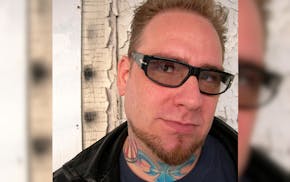Rabbi Max Shapiro, the influential former senior rabbi of Temple Israel in Minneapolis who spent a lifetime working to end religious intolerance and social injustice, died Friday at his Minnetonka home. He was 92.
In his 22 years as senior rabbi, the temple's membership more than doubled. Today, with 2,000 members, it is the 10th largest Reform congregation in the world.
Shapiro, who could be a firebrand in the pulpit, won esteem as a Jewish leader who reached out to other community and religious leaders to bring social change.
He also knew the names of almost every congregant, and years after retiring he continued to visit and comfort those in need, friends and family members said.
Long list of accomplishments
He challenged people within and outside his congregation to fight anti-Semitism, racism and poverty. Those efforts produced a long list of accomplishments, including helping to build civil rights and neighborhood improvement programs in Minneapolis and creating a center for Jewish-Christian learning at the University of St. Thomas in St. Paul.
He explained his philosophy of religion and civic duty in a 1964 sermon: "It is not enough for us to applaud or even support civil rights legislation. Judaism instructs us to do more. It tells us to take the needy into our employ! It tells us to train him for a job! ... It is a religious duty! And it is imperative! For no community, no city, no nation can long endure so divided -- half affluent, half despairing."
"He had an extraordinary life," said Rabbi Barry Cytron, who succeeded Shapiro as head of St. Thomas' Center for Jewish-Christian Learning in 1996. "It is one of the great stories of Minneapolis."
Shapiro was born in Massachusetts on Jan. 31, 1917, attended Boston schools and later Clark University in Worcester and Boston Teacher's College. He was a teacher in a public school when World War II broke out, and joined the war effort first as a chaplain at an Atlanta hospital and later in the Middle East.
Out of that experience grew his desire to become a rabbi. He began those studies in 1950 at Hebrew Union College-Jewish Institute of Religion in Cincinnati, and was ordained five years later at age 38. He and his wife, Bernice, and their two children settled in Minneapolis in 1955, when he began his new career as assistant rabbi at Temple Israel. It was the only temple he would ever serve. He became senior rabbi in 1963, and led the temple for 22 years.
"He created the most wonderful community inside and made this large congregation feel like home to generations of families," said Marcia Zimmerman, now senior rabbi of the temple. "There are two parts of being a rabbi. One is caring and comforting people, and the other is being the prophet and shaking them up and moving them to another place. He could do both with such beauty and care."
Under his leadership, the temple became the first in the area to have a social action committee, to teach a course in black history, to send a delegate to walk with civil rights leader Martin Luther King Jr. and to resolve not to trade with any business that discriminated in hiring, according to "Here Am I; Send Me," the first of two books of sermons that Shapiro published.
Politicians sought him out
He served on a city civil rights council and the Urban Coalition, and was a lifelong member of the NAACP. He met and was consulted by many political leaders, including Sen. Hubert Humphrey and President Jimmy Carter. Shapiro served on a wide range of religious and civic boards -- ranging from Planned Parenthood to the Minnesota Rabbinical Association -- and received many honors.
In 1985, he co-founded the Jewish-Christian Learning Center, which brought in speakers and developed courses on Jewish-Christian subjects at St. Thomas. In 1996, he retired as the center director. He remained active until recently.
He is survived by two children, Susan of Los Angeles, and Steven of Minneapolis, a grandson, and his wife, Abby Lou Evans. His first wife, Bernice, died in 1984.
Services will be held at 11 a.m. Tuesday at Temple Israel, 2324 Emerson Av. S., Minneapolis.

Whitey Herzog, who managed Cardinals vs. Twins in 1987 World Series, dies

Official who helped MSHSL on pioneering ventures dies at 89

Former 'KQRS Morning Show' prankster Lee Siegfried, aka Crazy Cabbie, dies at 55

Richard Serra, who recast sculpture on a massive scale, dies at 85

